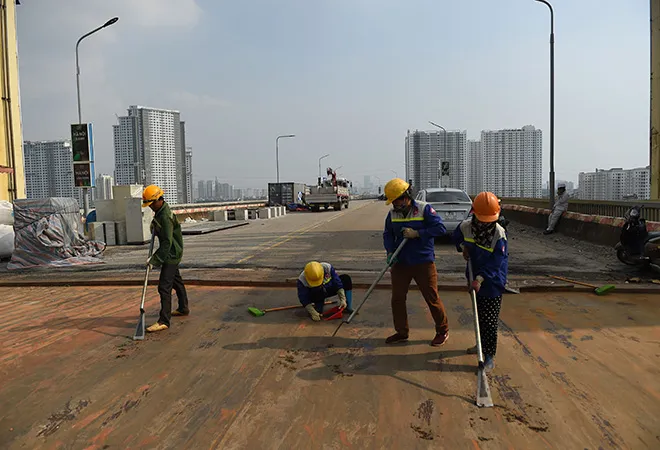
The effect of trade on labour markets has always been the source of much debate among economists and policy-makers. Empirical studies on the subject have produced mixed results, with some associating trade with increased informalisation of employment and greater wage inequality while others suggest that trade leads to reduced informality and promotes better working conditions. According to the World Employment and Social Outlook 2015, although trade usually generates economic benefits for firms, these do not always translate into better wages for workers. Some critics also claim that working conditions in developing countries remain poor due to the unequal distribution of the benefits of free trade. These concerns have only been aggravated by the rapid growth in the number of Free Trade Agreements (FTAs) worldwide since the 2000s. In order to address these issues, governments began to include labour provisions in their FTAs in an attempt to ensure certain basic labour standards between trading partners. According to the International Labour Organisation (ILO), labour provisions have the following functions: (i) Providing standards which address minimum working conditions (Occupational Safety and Health) and terms of employment (hours of work and minimum wages). (ii) Outlining mechanisms which promote compliance with these standards. (iii) Creating a framework for cooperation and dialogue on labour issues and monitoring of the same. The Core Labour Standards of the ILO (Freedom of association and the right to collective bargaining, the elimination of forced labour, the abolition of child labour, freedom from discrimination at the workplace), are usually taken as a baseline for provisions relating to labour standards in FTAs.
The inclusion of labour provisions in Trade Agreements comes with debates of its own. Those who argue for the inclusion of labour standards are generally of the view that these provisions serve as a kind of safeguard against the potential negative effects of free trade and also prevent developing countries from lowering their labour standards and, subsequently, engaging in a “race to the bottom” to gain a comparative advantage. Critics of labour provisions on the other hand believe that they are protectionist in nature and favour developed nations which impose unrealistic labour standards on developing countries in order to prevent them from making use of their comparative advantage in cheaper labour.
Large scale surveys have reportedly not been able to find any positive impact of the inclusion of labour provisions in FTAs on labour standards yet. Some studies find that while there is no statistically significant relationship between labour provisions and labour market outcomes, their presence does not seem to have any adverse effects on trade. Although there is no consensus regarding the degree of their effectiveness in improving labour standards, labour provisions have become quite common in FTAs in recent times (Over 80 percent of FTAs that have come into force since 2013 have labour provisions included). Labour provisions are also no longer limited to agreements where developed countries are trading partners. At present, over a quarter of all such trade agreements are between developing countries.
Although there is no clear consensus on whether labour provisions in FTAs affect labour standards, a case may exist for their inclusion in such agreements. FTAs with labour provisions have the potential to initiate labour law reforms and ratifications of the core ILO Convention among member states.
Vietnam, which has a poor track record internationally in terms of labour standards and working conditions, has recently signed and ratified two FTAs containing labour provisions, the Comprehensive and Progressive Agreement for Trans-Pacific Partnership (CPTPP) in November 2018 and the European Union-Vietnam Free Trade Agreement (EUVFTA) in June 2020. Under both these agreements, the signing parties state their intent to ensure labour rights by reaffirming their commitment to the ILO Declaration on Fundamental Principles and Rights at Work and the four Core Labour Standards of the ILO. A Labour Council composed of senior governmental representatives assigned by each member state was established under the CPTPP for the purpose of overseeing all matters relating to the labour chapter of the agreement and ensuring the implementation of its provisions. The EUVFTA also contains similar monitoring and review mechanisms under its ‘Trade and Sustainable Development’ chapter. Cooperation among members is an important tool for dispute resolution in these trade agreements. It is important to note here that the scope of labour provisions in these FTAs is limited to issues related to trade and investment between the signing parties. They do not seek to regulate the overall labour relations in these countries. Despite this, labour provisions have the potential to impact labour legislation at the national level as well.
Participation in these FTAs presents Vietnam with a number of opportunities and challenges. In terms of opportunities, through the CPTPP Vietnamese exports gain access to new markets like Canada, Mexico and Peru, countries with which it does not have any trade agreements currently. The CPTPP is also expected to create an annual 20,000-26,000 jobs on an average for Vietnam. Some of the major challenges on the other hand are improving global perceptions regarding the low level of labour standards in the country and making the necessary changes in domestic labour laws to better align them with the required international standards. In a way, these challenges can actually prove to be an opportunity for Vietnam to modernise its labour laws and push for improvements in labour standards.
A landmark step was taken in this regard by Vietnam in its new Labour Code of 2019 where it recognised the right of workers to form independent unions and engage in collective bargaining. It also ratified the corresponding ILO Convention on collective bargaining, one of the Core Labour Standards of the ILO. This is a major shift from the traditional union structure prevailing in Vietnam which, until recently, required all unions to be affiliated with the Vietnamese General Confederation of Labour (VGCL), which functions under the ruling Communist Party and is Vietnam’s only national trade union centre. Vietnam also ratified another fundamental ILO Convention on the abolition of forced labour in June 2020.
While these changes are recent and their real effects are yet to be seen, they are definitely a step in a progressive direction and are indicative of Vietnam’s commitment to adhere to the kind of international standards required by the Labour Provisions in its FTAs. The VGCL has received a great deal of criticism for being a poor representative of worker interests. New independent unions may be able to voice the concerns of workers more effectively and help in reducing the rising strikes in export-oriented industries in Vietnam.
Malaysia has signed the CPTPP agreement but has not ratified it yet. As an exporter of palm oil, rubber and electronics, it is expected to benefit from the CPTPP through expanded access to new overseas markets such as Canada, Peru and Mexico. Like Vietnam, Malaysia’s domestic labour laws are not quite up to international standards at present. It has already initiated the reforms process necessary to align its laws with the requirements under the CPTPP. To achieve parity with the required standards, a number of amendments are needed for laws in Malaysia governing freedom of association, forced labour, child labour and discrimination at the workplace. Proposals for introducing anti-discriminatory laws have already been floated and similar measures covering other areas are expected to follow. Malaysia has not ratified two Fundamental ILO Conventions on freedom of association and discrimination in employment. It has also denounced the convention on the abolition of forced labour. While the ratification of fundamental ILO conventions is not mandatory under the CPTPP agreement, members need to comply with the 1998 Declaration which protects basic worker rights. Regardless of this, Malaysia is showing a growing commitment towards the ILO objectives of worker rights protection. Although it is unknown when the CPTPP will finally be ratified by Malaysia, its labour provisions have set off a reform process in the country which is expected to benefit workers in the long run.
In both the cases of Vietnam and Malaysia, the presence of labour provisions in trade agreements has motivated governments to amend labour laws at the national level. In the case of Vietnam, it has even led to the ratification of fundamental ILO conventions. The ITUC Global Rights Index 2020 rating for worker rights in Malaysia and Vietnam was 4 (on a scale of 1 to 5+, 5+ being the worst). The index uses 97 indicators, some of which are covered by the reforms we mentioned earlier. The recent legislative changes at the national level and ratification of relevant ILO Conventions can thus serve as important initial steps towards improving working conditions in these countries. Trade agreements with labour provisions are becoming increasingly common, with their share having risen from 7.3 percent of the total number of agreements in 1995 to 28.8 percent in 2016. This suggests that labour provisions are fast becoming the policy of choice when it comes to ensuring compliance with labour standards in matters of trade. Hence, they may have an important place in future trade agreements.
The views expressed above belong to the author(s). ORF research and analyses now available on Telegram! Click here to access our curated content — blogs, longforms and interviews.




 PREV
PREV



